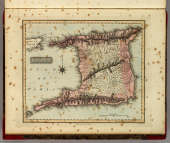Home > Themes > Waves of colonization and control in the Caribbean > Waves of Colonization
Waves of Colonization
-
First Wave, Pre-Columbian Arrivants
- The 23 octobre 2013 00h00
The dominant discourse in the Caribbean for years has been that Christopher Columbus on October 12, 1492 DISCOVERED the Americas by landing on San Salvador in the Bahamas, called Guanahani by the Tainos who resided there. This discourse presumes is that the people who occupied the Caribbean at the time did not 'discover' the land upon which they resided and that there were no explorers prior to Columbus. R......
-
Columbus’ Voyages and Legacy
- The 23 octobre 2013 00h00
After the Reconquista to oust the Moors from Spain ended with the capitulation of Granada in 1492, the monarchs of Spain, Isabella and Ferdinand, sponsored the Italian Christopher Columbus' voyage to the Caribbean. Involved in the war to reclaim Spain from her Muslim conquerors for centuries, the coffers of Spain were now empty, men who had made a lifetime and living of fighting, now had nothing to do and ......
-
Opposition to Spanish Monopoly: The Unwelcomed French, English and Dutch
- The 23 octobre 2013 00h00
The economic system which governed the colonisation of the Americas was mercantilism or merchant capitalism. To be effective, mercantilism had to operate in tandem with colonialism to ensure that the wealth of the subordinated country belonged to the dominant one. It was believed that if the mother country could control all goods in and out of the colony, ensuring that no other country could trade with it,......
-

Trinidad, 1498-1962
- The 23 octobre 2013 00h00
At the time of European contact, Trinidad had been settled for at least 7000 years through successive waves of colonization by people from the vast area between the Amazon and Orinoco rivers. In 1498, when Columbus arrived during his third voyage, the island was inhabited both by Arawakan-speaking people and by Cariban-speakers (Kalinagos or Island Caribs). <!-- @page { margin: 2cm } P { margin-bottom: 0.......
-

Tobago – In and Out of Colonial Empires
- The 23 octobre 2013 00h00
Tobago stands out in West Indian history as a territory that European colonizers bandied about among their overseas empires on at least 33 occasions from 1498 to 1814. Spain, the first to take Tobago into its clutches of colonial rule, exerted a tenuous hold on the island from 1498, when Christopher Columbus first sighted it on his third Indies voyage and called it Assumption, to about 1627. Some sixteenth......
-
Maroons in the Caribbean
- The 23 octobre 2013 00h00
Communities formed by self-liberated slaves dotted the fringes of plantation America, from Brazil to the southeastern United States, from Peru to the American Southwest for more than four centuries. Usually known in Spanish as palenques and in Brazilian as quilombos or mocambos, these new maroon societies ranged from tiny bands that survived less than a year to powerful states encompassing thousands of mem......
-
THE EXPERIENCE OF INDIAN INDENTURE IN TRINIDAD: ARRIVAL AND SETTLEMENT
- The 23 octobre 2013 00h00
Between 1845 and 1917 a total of 143,939 Indians migrated to Trinidad under the system of Indian indenture. Most of these indentured labourers were drawn from the agricultural and laboring classes of the Uttar Pradesh and Bihar regions of north India, with a comparatively smaller number being recruited from Bengal and various areas in south India. Approximately 85% of the immigrants were Hindus, and 14% Mu......

